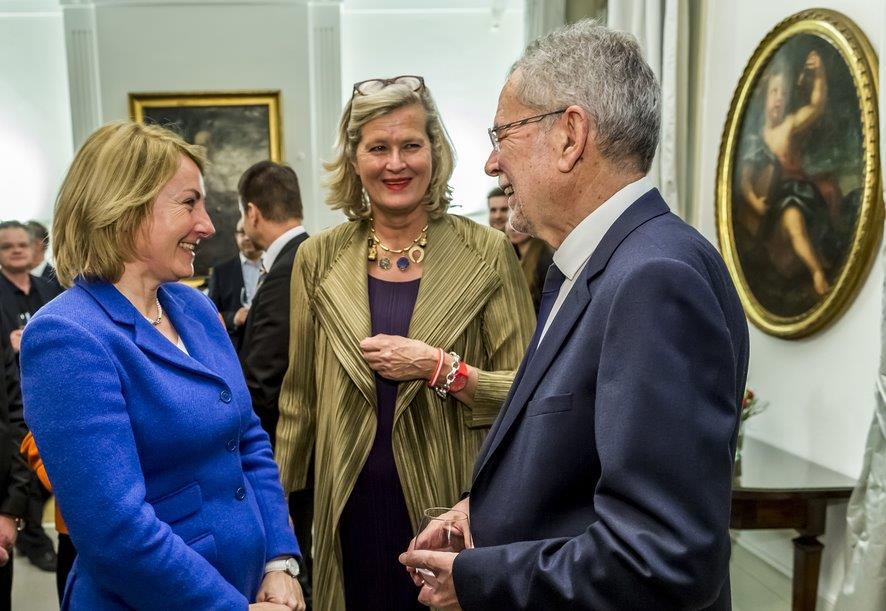Yesterday I met Alexander van der Bellen, the new Austrian President, at a reception in his honour in Berne.
In personal conversation, he came across as incredibly sympathetic, human, almost a little awed by all the homage that was shown him this evening by his countrymen. His verbal restraint and prudent communication helped him to win the election in December 2016.
A look back at the election campaign
It was a victory of reason over rage at the table. A triumph of the peace-minded community of values over the risky playing-with-fire of the political arsonists. In the second run, the Austrians clearly decided: Alexander van der Bellen won the 2016 federal presidential election with 53.3 per cent of the votes. This result had been preceded by an election campaign that hit below the belt.
Scorched earth
Van der Bellen, former party leader of the Greens, had a political opponent in Norbert Hofer of the Freedom Party of Austria (FPÖ), for whom no game was too dirty to demolish the image of van der Bellen. Hofer tried to discredit him as a Nazi, then again as an errant Communist. The bottom line was always the same: The other is a liar. For this, Hofer posed as the saviour of Austria, who did not exclude its withdrawal from the EU, but all the more vehemently precluded Turkey’s accession, and would have gladly sent the Muslims in his home country back to their own countries.
Smart communication wins over the long term
But if the US presidential election clearly highlighted anything, then it is this: It is a cheap choice to choose a candidate for a single reason – to wipe out the other, especially the “established” one. Democracy means to make use of one’s right to co-determination and to contribute. We have become very comfortable with our Western European abundance. So convenient that we consider peace and freedom as a self-evident, immutable commodity. In fact, however, it is a lasting commitment for each of us to stand in a community of values for those values and to maintain them. The refugees who are coming to us are showing us drastically: In other parts of the world these values have been lost. Commonwealths are brutally destroyed by wars and power games.
Achieve the goal with diplomacy
While Norbert Hofer had his eye on a solo performance, van der Bellen went for connections, drawing in the process on the knowledge that has always come with diplomacy: Understanding, international networking and cooperation prepare the ground on which peace grows. His slogan “reason, not extremes” obviously gave the Austrians food for thought. This does not mean that they have chosen the optimum with van der Bellen. But they have spoken out for the preservation of their community of values and recognised what they would sacrifice through a protest vote. Because the attitude that Hofer represents is anything but diplomatic, which his communication clearly revealed in this election campaign.
One should not play with fire, nor with words. First the tone becomes abrasive, then the behaviour. The Jewish Talmud says: Watch your words, for they become actions. Example of refugee discussion: If we increasingly regard strangers as a potential source of disturbances, harassment and hostile attacks in working life as well as in everyday life, how can we, then, live and work together peacefully? Whoever ignites with words will one day reap a forest fire. In our time of crisis, we need an attitude of benevolence to others to find solutions to the problems rather than to maintain an attitude of demarcation.
Together problems will be solved
The Austrian election campaign of the candidates brought it painfully to mind: The further we derail verbally, the more we move away from our common values. In everyday terms, a different language is urgently needed in communication: mindful, appreciative, de-escalating. Diplomacy regards others not as potential opponents, but as possible allies. A diplomat thinks constructively, not destructively: What common goals – however short-term they are – could give him and a complete stranger cause to work together to achieve a greater goal? The Austrians clearly had a common goal when the majority of them decided on van der Bellen: not to weaken Austria’s position in the international community and to continue to work on cooperation. It is a signal that is hopeful for the challenges we are facing.


Leave A Comment